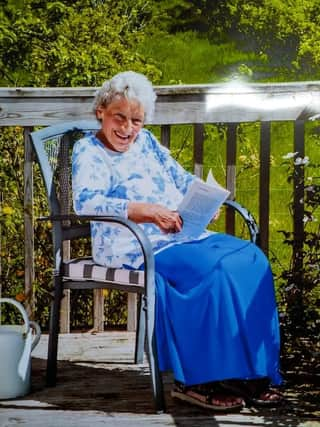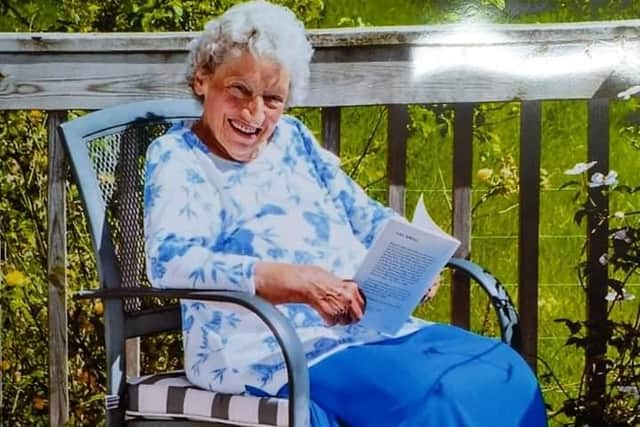Obituaries: Margaret Gillies Brown, Scottish poet of the positive


When she wrote her first piece of verse her mother predicted she would become a poet. The young Margaret Gillies Brown was a mere four years old at the time.
And, as a teenager, it seemed a career as a wordsmith was on the cards when she had ambitions to become a journalist. But a change of mind saw her train as a nurse and become a farmer’s wife, migrating to Canada for a time, living with her family on an isolated farm in Alberta’s frontier land.
Advertisement
Hide AdAdvertisement
Hide AdThat early dream of writing fell well and truly by the wayside, superseded by seven children and a hectic family life. Then, more than 40 years after she first put pen to paper, Margaret Gillies returned to her first love of poetry, taking up writing again seriously and producing an impressive bibliography, much of it inspired by her love of nature and her own experiences of farming life here and in Canada.


Three of her largely biographical books were serialised in a newspaper, many poems were published in magazines and two of her volumes recognised with awards from the Scottish Arts Council. She had made up for lost time with a prodigious and well-received output, becoming one of a relatively small number of Scottish women poets published during the 1960s and 1970s
Born in Longniddry to Jessie Pollock and her husband Henry, a sales rep, Margaret was a sickly child and often missed school, but was taught by her mother, whose fondness for literature was a big influence during her childhood. She said she liked the idea of becoming a poet and wrote both poetry and prose as a youngster.
Despite having flirted with the idea of journalism, she opted for nursing, training in Dundee where she grew up during the Second World War. While nursing at Dundee Royal Infirmary from 1949 to 1953 Margaret met her first husband, Ronald Gillies, at a nurses’ dance. He was a sheep farmer in the Sidlaws and they married within six months.
Five years later, with three young sons and expecting their fourth baby, the family moved to Canada. Life on the remote Alberta farm was not easy and would form the basis for her book Far From The Rowan Tree.
They spent three years there until her father-in-law asked her husband to run East Inchmichael farm in the Carse of Gowrie.
Returning to Scotland with five children, they spent 20 years running the farm and added another two youngsters to their family. Margaret had apparently wanted 12 children and adored being a mother and grandmother, happily attempting to squeeze all the children and grandchildren around the table and always keeping a huge pot of homemade soup at the ready. She had even been known to feed 50 at Christmas.
It was when her youngest child had gone to school that she began writing again in earnest and subsequently produced at least nine poetry books and the Rowan Tree series of biographies.
Advertisement
Hide AdAdvertisement
Hide AdThey included A Rowan Tree In My Garden, capturing life in wartime Dundee, her nurse training and working on the land, and Around The Rowan Tree, concentrating on her return to Scotland, life as a farmer’s wife and raising seven children.
A member of the writers’ organisations International PEN and the Society of Authors, she had been spurred on by attending a creative writing class. She was one of the founders of Perthshire Writers’ Group and was latterly appointed to the lifetime role of its honorary president.
Part of the appeal of her work was its accessibility and focus on farming and nature. She homed in on things that amazed her, hoping that at least some readers would see things as she did.
Discussing her literature with The Courier in 2019, she said: “I like to write poems that people understand. I object to terribly academic ones where you’re supposed to know what the poets are thinking. That puts people off poetry.
“I like to write about the simplicity of farm life. I keep away from miserable poems, although I have written some.”
The joy of nature was something she shared with her children, who enjoyed the freedom of farm life, walking the fields as she regaled them with her travel adventures and listening to the song of the skylarks.
Widowed in 1982 by the death of Ronald, she and the family were left to run the farm. But rural life was in her blood: her mother had been brought up on a farm in Aberdeenshire and Margaret recorded her life in another of her books, The Wind In Her Hands.
A few years ago she expressed a desire to see how the Aberdeenshire property looked now and was driven north by one of her sons.
Advertisement
Hide AdAdvertisement
Hide AdAs he sought out the new owners, a woman he encountered explained there was a marvellous historical description of the area in a book by a woman called Margaret Gillies Brown. She was astonished to see the author sitting there before her.
An outgoing, optimistic and positive person, Margaret had married again in 1984, to Henry Brown, but was widowed once more in 2003.
Latterly she lived in a timber cabin close to the family at their farm and Cairn o’ Mohr winery. One of her sons had learned to make log cabins in Canada and it reminded her of the wooden shack that had been the family’s first home in Alberta more than half a century earlier.
She is survived by her children, Richard, Michael, Ronald, Mahri, Grant, Lindsay and Kathleen and large extended family.
Obituaries
If you would like to submit an obituary (800-1000 words preferred, with jpeg image), or have a suggestion for a subject, contact [email protected]
A message from the Editor
Thank you for reading this article. We're more reliant on your support than ever as the shift in consumer habits brought about by coronavirus impacts our advertisers. If you haven't already, please consider supporting our trusted, fact-checked journalism by taking out a digital subscription. Click on this link for more details.
